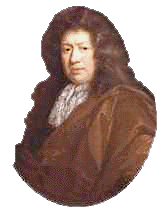
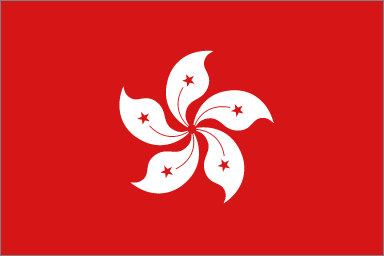
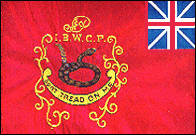
Reading an Economist article on the religious left in the USA, I decide to do a little research on Hong Kong’s dedicated legislators. Thanks to the Legislative Council website, I discover the following...
Political Group Total Christian* Buddhist Not declared
Pro-Beijing 35 6 (17%) 3 (8.5%) 26 (74%)
Pro-Democracy 25 9 (36%) 0 (0%) 16 (64%)
% of those declaring a religion
Pro-Beijing 66% 33%
Pro-Democracy 100% 0%
* inc. Catholic, Protestant, Church of England
Are non-believers more prevalent among supporters of the atheistic Communist regime, or are pro-Beijing figures simply more reluctant to reveal their faith? DAB voters are notorious for hiding their voting intentions before elections, maybe out of shame, but mainly because they are elderly and uneducated, and pollsters give them the creeps. My ethnocentric guess is that at least a few of the pro-Beijing Legco members not declaring a religion are adherents of the Taoist-Buddhist-Confucian melange typical of many traditional Hongkongers – painting bedroom doors red to enhance number-one daughter’s marriage prospects, burning incense before betting on the horses, etc. But they don’t want to admit it for fear of appearing unworldly beside the glamorous and urbane Audrey Eu and other followers of Western ideas like monotheism and democracy.
What seems clear is that, unlike in the USA, Hong Kong’s Christian politicians are generally in the liberal-minded, progressive faction – which raises interesting questions about Catholic Chief Executive Donald Tsang’s tormented conscience.
I wouldn’t be doing this if it wasn’t raining.
LATE AFTERNOON, and I stroll down to wild American friend Odell’s place to ask him to put a few entries into this diary over the next three days while I am on the exciting, free Super-Cheapo Package Tour of obscure corners of Guangdong Province. His Thai wife Mee answers the door and lets me in, complaining that her husband was a bad boy last night. “Monkey ass got drunk! In Wanchai! Put his phone in glass of beer! Come home! Then wash in water! Then dry with towel! Then put in microwave!” The ex-Mormon is sitting on the sofa, holding a glass to his mouth. He tries to put it down, but his lower lip is stuck to the rim, which has some sort of brown sticky tape wrapped around it.
“Helk!” he pleads, looking up at me. “Helk ngee!” I manage to detach the vessel, though not without getting my own fingers caught in the tackiness of the flypaper. “Thanks,” he mutters. “I’m trying to invent a way of stopping beer flies from diving into people’s drinks. Might as well, since I’m grounded after last night.”
He watches as Mee storms off into the kitchen. “Yeah, well,” he ponders, “the phone’s still under warranty... She kept phoning me, over and over. What else could I do?” On the floor in the corner of the living room, someone has flung a white shirt with traces of what must be orange lipstick on the collar, a crunched-up credit card slip and a small, badly mutilated bunch of flowers. This domestic grief is about more than just an Ericsson T230 plunging into a pint of San Miguel like a massive Drosophila looking for a fermenting apple to lay its eggs on. It is not a time to ask a favour. This diary will have to wait until Thursday
Monday, 29 May
My instructions are to find a Ms Chan at Peking Road, at 7am. How many Ms Chans will there be in a Tsimshatsui street? As it happens, she is easy to find, looking important in a bright blue travel agency uniform and holding a clipboard. Fat Karen and another of S-Meg Holdings’ lower-ranking female staff are also there, along with their respective spouses. The Spring dinner prize was a trip for two, they ask. Why didn’t I bring anyone with me?
“I have no friends,” I reply, “and if I did, I wouldn’t wish this on them, even assuming they would agree to come – which they wouldn’t.” As they digest this, we board a bus. It trundles through the morning traffic to call at exotic Shatin and mystical Fanling to pick up more victims. By the time we get to the border at Shataukok, there are, not counting the driver, a dozen of us – me, plus five, very average 30-something couples, and Ms Chan, who introduces herself as Yo-yo.
Once on Mainland territory, in a damp suburb of Shenzhen, we transfer to a minibus and are joined by our guide, Boris. We head east, and he assures us that our destination is safe. “People in Shantou and Chaozhou don’t speak Cantonese,” he admits, “but Chiuchow food is not strange. You can eat it with no problem.”
After passing through rush-hour traffic, we set off along the Shen Shan Expressway. We pass by suburbs devoted not only to light industry, but offices and shopping centres – the modern buildings rising from the woodland remind me of the exurban landscape around Washington DC, around areas like Tyson’s Corner, Herndon and Vienna. After 50 miles or so, we are surrounded by mountainous scrubland, much like the New Territories, except it goes on and on, like real wilderness. Just an hour away from the border.
I spy a business opportunity – lots of unused south-facing slopes begging to be subdivided into grave plots, with no-one’s feng shui to wreck. Looking around the minibus, I see I am alone in finding the scenery interesting. Every other fellow tourist is asleep. A few have brought little blow-up pillows that wrap around their necks, like air travellers who take things too seriously.
Lunch is in a cavernous but otherwise deserted tourist restaurant in a coastal settlement called Houmen. Fellow-travellers murmur their approval at the gwailo’s chopstick skills. I must have a very high IQ, they more or less venture to suggest. And who am I to disagree? Back on the bus, we zip past lychee orchards and duck and fish farms, while Boris tells us more about where we are going. “We are now in the Chiuchow area,” he declares. “These people traditionally are involved in smuggling, piracy and illegal emigration.” The road surface becomes rougher, and I wish I hadn’t had so many fishballs. “When we arrive at the hotel, you will have a seven course dinner,” Boris tells us. “After that, you are free. If you like, you can go to the night market and try typical Chiuchow beefballs.”
Thanks to maintenance works, the Shen Shan Expressway – a four-lane freeway in theory – is reduced to one lane in each direction for most of the second half of the 400-kilometre journey. It’s almost as bad as certain major roads in certain First World countries I can think of. At a Sinopec service station, I look around the little supermarket. Oil, car batteries, ice cream, cold drinks, big bottles of beer, jars of dried fruit peel and an impressive range of pornographic magazines and DVDs, gleefully defying their illegality in simplified characters.
Later on, we drop into a tea plantation and sample six different types of brew. Maybe I am mesmerized by the tea babes who hand out the little cups, but I am most taken with a variety called ‘one leaf’ and actually buy some. Initially tasting bitter, then becoming sweet to the palate, it seems to complement my personality. Or something.
On the outskirts of Shantou (aka Swatow), we visit a temple at the top of a mountain. “Chiuchow people are the Jews of China,” Boris informs us. “They make lots of money. So they like to renovate temples like this to give everyone the impression that they are honourable.” This site dates from the Ming dynasty and has a huge boulder hollowed out to make a chapel. We then visit another temple, funded by overseas Chinese billionaires and opened by the Queen of Thailand. It is aimed at encouraging people to seek simple and contented lives. And then a third temple, with a hot spring that cures all sorts of ailments. Or it might, but Boris has other ideas. “Don’t drink it,” he warns.
Finally, we drive into Shantou city. “This is the peanut candy capital of the world,” we are told, “and on your left is the TV tower, which is the worst one in China.” Boris points out the new apartment blocks in a suburb on reclaimed land. “These flats are very nice and they only cost…” At this point, his mobile phone goes. We all wait in suspense while he finishes the call. “…You can buy them for HK$300,000,” he concludes. Waaah!
“Most drug dealers are Chiuchow,” Boris tells us as we get out of the bus to check in to the Meritus Hotel. “This place is partially closed owing to lack of business. The bathrooms are really big – you can get four people in a shower.” Waaah!
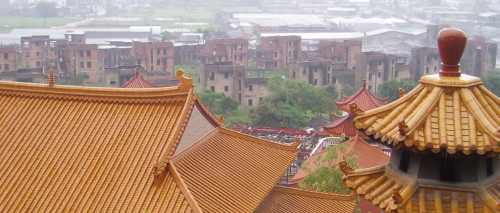
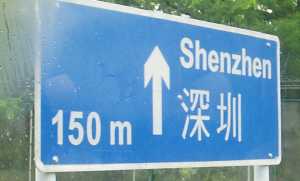
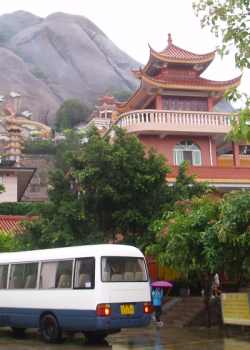
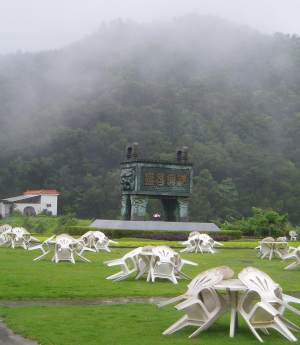
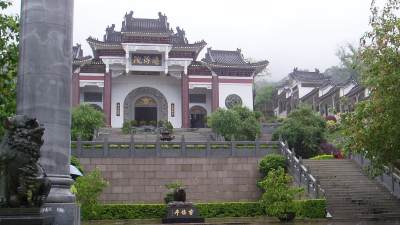
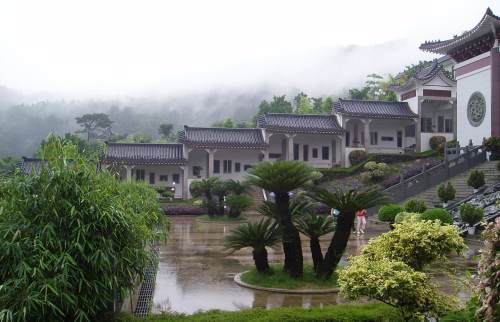
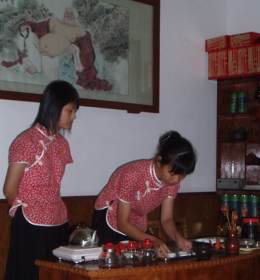
The first stop is another tea plantation, complete with another quick lesson on the noble art of making what I have long assumed to be an extremely tedious drink. I now know that it is necessary to throw the first dash of hot water out of the pot to clean the leaves – the discarded liquid is known as ‘foot-wash water’. The real purpose of our visit, however, is to try the farm’s honey and, in particular, a bitter, black jelly made from magic bee excrement, which is, inevitably, good for health. So expensive is this precious substance that we are asked to contribute RMB10 towards the free sample.
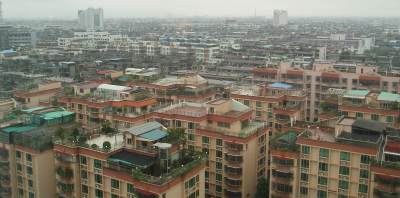
Being off-limits to visitors, the monks’ quarters demand a quick peek through the courtyard doorway. Their saffron robes hang from their verandas. The asceticism of their lifestyle can be judged by the cheap, non-brand name air-conditioning units in the bedroom windows.
After a suitably frugal vegetarian lunch, at which everyone complains about the gritty rice and less-than-fresh stewed celery, we are on the road again, driving through a variety of light industrial suburbs. One district is devoted to manufacturing toilets and sinks, and even sports a Ceramics Capital Middle School. This gives way to the beads zone, which feeds the world’s inexplicable appetite for lurid, sequin-covered handbags. Then we enter the neighbourhood of food additives, which gives way to muddy fields and dilapidated villages. After 20 minutes, we turn off onto a rutted road leading past banana trees, filthy motorbike repair shops, nasty small concrete houses and occasional larger, luxury villas. People sit around doing nothing – it’s as if we’ve suddenly left China and entered Southeast Asia. The only movement is from chickens and dogs, and a few people’s heads turning to watch us. The arrival of a tourist bus is clearly a bit of a novelty. My fellow passengers are oblivious to all this, chatting about souvenirs and previous package tours.
Eventually, we get to Dragon Lake Village. It is an old walled settlement. Boris says it is so poor it qualifies for aid under the latest Five-Year Plan’s rural poverty reduction programme. An expensive board outside welcomes tourists. A few modern, shiny bilingual signs add a dash of incongruous colour to the streets, pointing out supposedly noteworthy features. Otherwise, apart from decently maintained paving stones by local standards, it is untouched. Sewers run down the middle of some streets, under metal grilling. Plants grow through cracked roof tiles. Reasonably clean but shabbily dressed folk tend little shops, waving flies away from orange-coloured chunks of drying tofu or sitting silently in unlit hovels behind a few jars of pickled plums. Through windows and doorways, we spy women of all ages doing piece work – threading sequins, packing little items into plastic bags and gluing gold edging onto paper offerings for the dead. They stare back. Behind a barred window, in a room lined with shelves of dusty boxes, an apothecary in a white coat grinds something in a mortar and pestle. Children peer out from alleyways and point at the strangers. For the first time, my companions stop prattling. Even after they get used to the smell, they are stumped. The place is waiting to be turned into a theme park, but the government people who put the signs up never came back. There is nothing for tourists to buy. Nothing to pose before for the camera, grinning and making a ‘V’ sign. We are bouncing along in the bus, halfway back to the food additives zone before normal chatter is resumed. “They took us there because it’s free,” Fat Karen tells me.
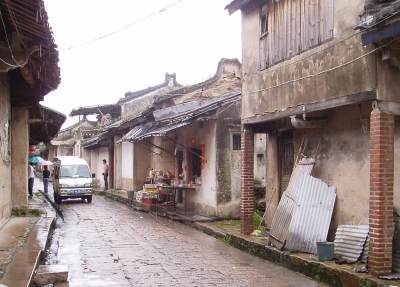
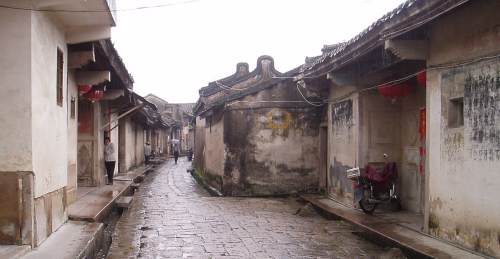
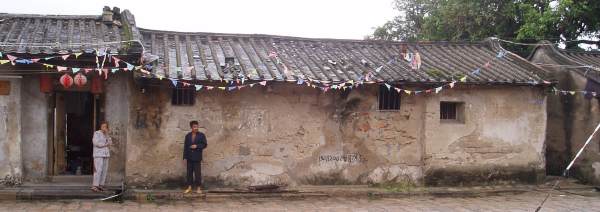
And so we bid farewell to historic Shantou and set off on our journey back to Hong Kong. But not before visiting one last attraction – possibly the weirdest of the trip.
As our driver expertly lurches between potholes, inter-city buses and over-laden trucks, it occurs to me that, despite being in a state of constant repair like many main roads in the Western world, the Shen Shan Expressway is unusual. There is zero roadkill to be seen – something I will ask my companions about over lunch. There are banners warning of the death penalty for highway robbery. There are toll booths in the least expected places, manned by toothsome young women who raise their left hand, palm outwards, as each vehicle pulls away. And there are frequent signs saying ‘Next Exit 30km’ or more, meaning that it provides no access to dozens of sizeable communities in its path through this well-populated region.
The effects of this seem evident when we pull off somewhere in Shanwei and have to double back around 10 miles, through increasingly ramshackle and lifeless towns. After some twists and turns, and another set of tollbooths for a stretch of modern road leading from nowhere to nowhere, we end up on a muddy lane going through a village with old but reasonably neat piles of rotting garbage on the sidewalk and plaster peeling off the mouldy buildings. At the end of the lane is a new, very long, tall, beautifully whitewashed wall. We stop outside ornate gates, which a man opens for us. We drive into a courtyard and alight, while another man opens an equally grandiose set of interior gates. We stroll into a massive square, with a fountain, a garden to one side, various statues, ornamental pillars and a large building in the far corner. Is the initial impression of Tiananmen intentional?
Apart from a few caretakers and gardeners, we are alone here. This is a freshly built monument to the glory of one Lam Sai-kam (various transliterations are possible). I think I know my tycoons, but I fail to pin this one down. Something to do with garments, says Boris, before adding, “probably money laundering.” This place would be a mausoleum, but for the fact that, apparently, Mr Lam is very much alive. At one end of the main parade-ground expanse is a statue of the great man, and a series of friezes showing his and his wife’s works, helping the young and old, leading, inspiring and building the community. Kim Jong-il would drool.
The house is a series of courtyards, linking open-walled chambers over-decorated with carvings, statues, plants and fancy ceilings. Lam apparently intends this as an example of what Southern Chinese homes used to be like – before they somehow turned into the crumbling and cracked, soot-stained slums invisible just yards away behind the towering walls. A smaller square to one side is lined by 300 or so marble panels featuring poems and pictures offered by shoe-shiners from Guangdong, Hong Kong, Macau, Beijing, other provinces and, of course, Thailand. It is hard to believe that this is the creation of a happy man. The place warrants a separate page of photos.
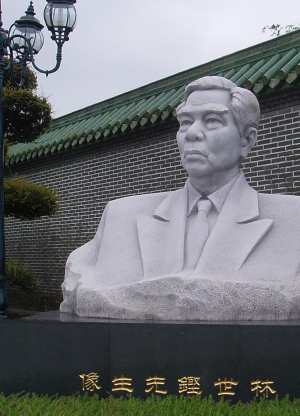
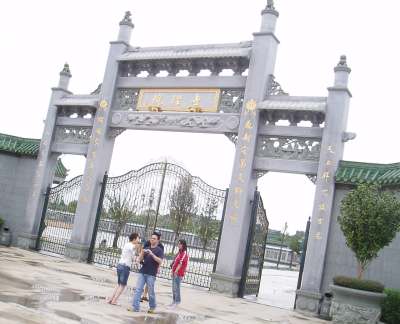

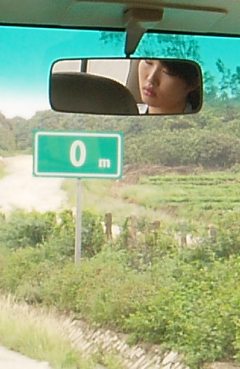
On the top floor of S-Meg Tower, the three Stanleys from the mailroom and Fat Karen report to the Company Gwailo for their weekly mp3. “This is by a group called Love,” I tell them. “It’s called Maybe the People Would Be the Times or Between Clark and Hilldale.” They look slightly puzzled. But that’s nothing. I’m still trying to work out how the travel companies can make a profit from these package deals. The money doesn’t seem to add up. The retail price for our tour, according to Fat Karen, was HK$500 per person, plus a HK$150 tip for the guide and driver. Assuming that these two Mainlanders live off these gratuities and commissions, the company gets HK$5,000 from a typical group of five couples on a three-day, two-night trip. From this, it has to pay for...
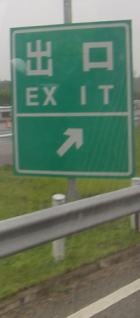
10 fancy hotel dinners
30 basic lunches
Around 50 admissions to temples, etc
Yo-Yo’s salary
Fuel for minibus, around 1,000km
Highway and bridge tolls (of which there are many)